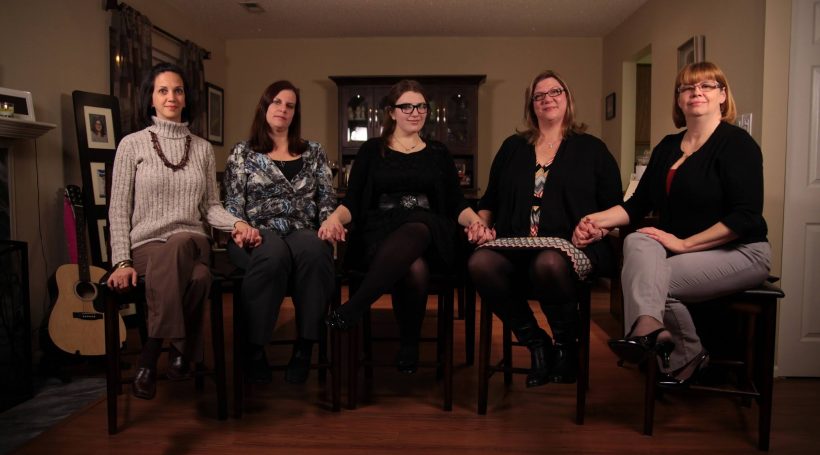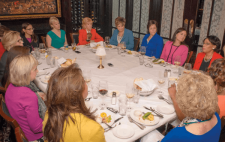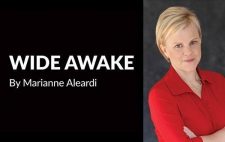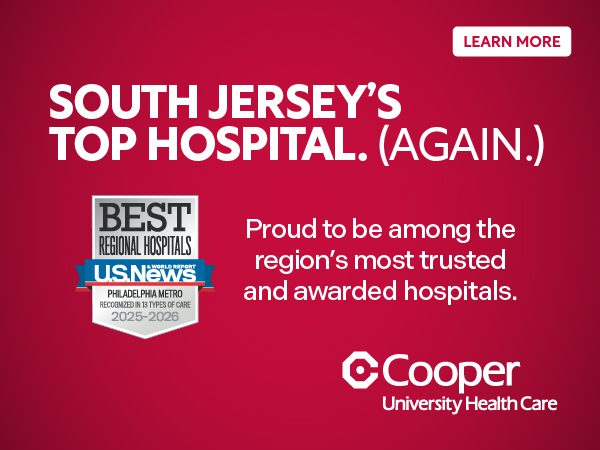Their connection is unmistakable. It shows in their body language, their conversation and their laughter. It shows in the way they tease one another over familiar foibles.
The five women who meet at the Cherry Hill home of Laura Watabu might be on a girls night out – except for the occasional tears and reassuring hugs they exchange when one of them stumbles on a difficult emotional memory. All of them are young widows who have paused to reflect on the experience – and title – not one of them expected so early in their lives. Their connection has become a mighty bond for all of them.
It was the night of her 22nd birthday when Theresa Savage got the call back in 2010. “It’s the ultimate horror call – the call that tells you someone you love has been killed in an accident. My husband and I had been married for eight months, and he was the love of my life.”
Savage had no time to grieve. Suddenly, her life was shattered, and she had to pick up the pieces. “I had to pack and move – alone. I had to figure out what to do. I couldn’t begin to absorb it all,” says Savage. She had no one her age with whom to share her grief. She was basically alone on her own bizarre island, struggling just to put one foot in front of the other.
She remembers the worst two things people could say to her: “You’re so young – you’ll remarry. And, “You’re so lucky that you didn’t have kids.” Three years later, Savage, who works in the hospitality industry, says wistfully, “I’d give anything to have been pregnant and to have his baby in my life.”
For Laura Watabu, 44, becoming a widow was also surreal. Her husband Dwayne wasn’t feeling well one evening back in 2007 and then complained of a tingling down his arm. “We both knew that wasn’t a good sign,” says Laura. Neighbors rushed over to stay with their daughter, who was 5 at the time, so Laura could get Dwayne to the hospital.
“He collapsed as we were going down a hallway to the emergency room, and he was never revived from a massive heart attack,” Laura explains.
Living away from her East Coast roots, but fortunately surrounded by good and caring friends, Laura walked numbly through the first weeks and months, then moved in with her parents on Long Island, where she had grown up. “It was helpful, but also not the right place for my daughter or for me to be.”
A high school friend from Long Island who had migrated with her husband to Medford was by Laura’s side through the worst of the early days and months. She invited Laura to come to New Jersey and handle human resources in her photo-scanning business.
“How do you ever thank a friend like that? She saved me, and so have these women,” Laura says, speaking of her “sisters” in a group that has wryly named itself “The Bad-Ass HALOS.” The acronym translates to “Healing After Losing Our Spouses.”
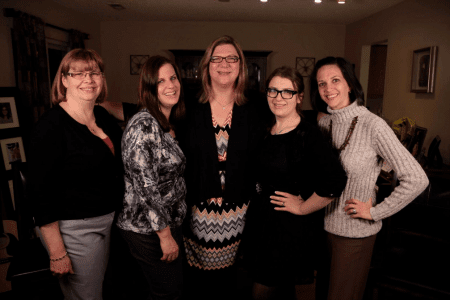 The five Halos might never have met had it not been for Samaritan Healthcare and Hospice in Marlton. The organization created a program called Early Endings as a support group for men and women widowed before the age of 50. Two years ago the five women came together in that group as strangers, and essentially have never left one another. When the six weeks of organized sessions ended, they simply decided to keep on meeting informally. It’s been a lifeline for all of them.
The five Halos might never have met had it not been for Samaritan Healthcare and Hospice in Marlton. The organization created a program called Early Endings as a support group for men and women widowed before the age of 50. Two years ago the five women came together in that group as strangers, and essentially have never left one another. When the six weeks of organized sessions ended, they simply decided to keep on meeting informally. It’s been a lifeline for all of them.
Denise Ordille, a gentle, soft-spoken Hammonton mother of a 4-year-old son, faced a terrifying end to her husband’s life. He had been diagnosed with Hepatitis C from transfusions early in his life, but was not incapacitated in any way. Denise knew of his medical history before they married, but it was a non-issue. After complaining of a stomachache for a couple of days – nothing that seemed ominous – Denise was upstairs napping when she heard her husband gasping. She found him struggling to breathe and called for help. He died that same day from internal bleeding. “I remember that I was frantic about our son, Will, and how to protect him from all of this.”
Some answers have come. A client services director, Denise has gotten tremendous support from her mother-in-law and other family members. But there are still those times when a 41–year–old widow with a young son doesn’t easily fit into a conventional coupled world. People have tried to find the right thing to say, the right words of comfort, the young widow relates, but very often they end up saying things that are insensitive.
“On the day I went to pick out the headstone for my husband’s grave, I was on the phone with a friend telling her about it,” recalls Denise. “She said that she knew just how I felt because she’d gone though a divorce. How could I tell her that she had no idea how it feels to pick out your husband’s headstone when you’re raising his child alone, and that child asks every day when he’ll get a new dad?”
Widowed in 2010, Tina Bowser of Mount Holly watched her husband Scott go from a healthy, strapping man into one struggling through exhaustion, headaches, forgetfulness and ultimately a diagnosis of brain cancer. Ironically, Scott worked at Cooper University Hospital, and he got his diagnosis from colleagues in the radiation oncology unit. A surgical intervention at a New York hospital – a last resort to buy time – left him partially paralyzed. Tina, whose daughter Jessica was only 1 year old, saw her life turn upside down.
“I began grieving when all of this began, and I’m still grieving,” says Tina, 47. “You mourn for the life you had, the one you want back. You grieve for your child. And yes, you grieve for yourself.”
A systems analyst at Bristol-Myers Squibb and the owner of Little Sport in Maple Shade, Tina’s work is challenging and often a huge distraction. But she’s found that single parenthood can be the most daunting work of all.
“Back at home,” says Tina, “I’m it. There’s nobody to run out and grab milk for tomorrow’s cereal if Jess is sleeping. There’s nobody to turn to and say, ‘I’ve had it – you take over for a while.’ So the small stuff can become the biggest challenge.”
“And sometimes,” she adds, “your friends think your family is there for you, and at the same time, your family thinks your friends are. And there you are, alone.”
For Angela Nadeau, it was a phone call from her daughter’s school three years ago that alerted her that something was terribly wrong. She was out of town on business, and her husband hadn’t picked up their daughter. That set off an instant alarm, since he was a devoted and conscientious father. Angela soon learned he had succumbed to heart failure that day, after about a year of denying health issues.
“You start questioning yourself, and I definitely did: had I done enough? Should I have done more?” says Angela, 52. “But in the end, he’s gone, and you’re left.”
Angela, who is the mother of two daughters, including one who is a student at Smith College, is the successful CEO of a computer data company. She doesn’t mince words: “This is a life-changer in every way, and it took me a very long, hard year just to try to figure things out. Everything feels cloudy, foggy. At some point,” says this strong, outgoing woman, “you realize you’re all you’ve got, and that your children are counting on you. That’s a huge transition to make.”
Angela’s sister-in-law – her late husband’s sister – has been an amazing source of support. “She thinks of me on every holiday – I guess I’m her stray. I’m extremely grateful, but I also want a chance to do good for others.”
The Bad-Ass HALOS turn to one another when things are tough – and they often are – and also when they try to bring some fun into their lives. And yes, they agree, fun gradually does return, along with a sense that because they have each other, they are not alone. There are dinners, outings, phone calls and the comfort of knowing that no matter how irrational an idea or emotion feels, they are not being judged.
Consensus comes easily as they think about the terrain of young widowhood. Among their observations:
The second year may be even more difficult than the first. The “anesthesia” of shock often has ended, and reality sets in. No, your husband is not coming back.
Solitary decisions – how to cope with a child’s pain of loss or what kind of comforter to buy – come in a steady pummeling stream.
There is no timetable to grieving.
Most in grief don’t want to hear that “He’s gone to a better place.”
The kindest thing to tell a young widow is not “I know how you feel,” but rather “I have no idea what you’re going through,” unless you’ve been there.
Your definition of “friend” may change based on people’s behavior. The most unexpected people sometimes step forward, and the ones you were sure you could count on don’t.
According to the HALOS, your perspective about almost everything changes. “You truly understand what’s important and what matters,” says Angela Nadeau. “And you really get it about what doesn’t.”


